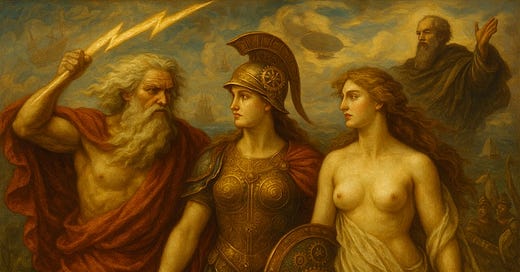It was the Fifth of September, 1973, and I had just moved up to Junior Class at Sidcup Hill Primary School. I had missed the first day of school because I was ill, so I missed the instructions for how things would be different for us grown-up children.
English schools in those days said the Lord’s Prayer every morning and sang a few hymns, too. I had just closed my eyes and put my palms together to pray when Graham grabbed my hands.
Our Father,
Who art in heaven,
Hallowed be thy name.
I opened my eyes, and Graham was forcing my fingers to intertwine. He shook his head as if to upbraid me for my ignorance.
“We don’t pray like that now. We are not infants.
That was the moment when I stopped believing in God. It all seemed so silly. I still enjoyed the hymns and the Lord’s Prayer. I just didn’t believe that the words were true.
I still enjoy going to church. In fact, I just went to Bristol Cathedral on Easter Sunday. I can appreciate my country’s culture without believing that Beowulf walked the earth or St George killed the dragon. I can enjoy going to church, too.
English atheists are far more relaxed about religion than their American cousins. It’s all very relaxed over here, and no one even cares whether you are a believer or not.
What did the New Atheists achieve?
Growing up in England in the 70s and later as an adult in the 80s, there was very little tension between Christians [1] and atheists [2]. As far as I knew, very few of my friends and acquaintances were Christian but, even so, practically everyone went to church when the occasion called for it and everyone spoke The Lord’s Prayer in school assembly every…
I read a Substack article last week asking atheists which argument for God seems most persuasive, even if it doesn’t entirely persuade them. The most popular argument by far is the fine-tuning argument.
Scientists say that there are a bunch of constants that determine the shape of our universe. If the gravitational constant were a bit stronger, our stars would all be sucked back into a singularity. If it were a bit weaker, they’d all fly off into infinity. Either way, there would be no Earth — and no humans. It is a lucky coincidence that these five or six constants are all just right because if they were a little different, we wouldn’t be here. According to the fine-tuning argument, it’s unlikely that all these constants could be just right all on their own, so we must assume that God did it.
I’ve never been even remotely tempted by the fine-tuning argument. If it’s unlikely that the constants came about on their own, it’s just as unlikely that God came about on His own to set them. And who said they came about at all? Maybe they just are.
This Substack, Journey Through Reality, has several more objections to the fine-tuning argument and is a great read.
The most convincing argument for me is the Watchmaker Argument.
In the watchmaker argument, William Paley asks us to imagine walking across a heath. If we come across a stone, we can imagine it having been made by the weather — or perhaps it had been there forever. But if we come across a watch on the heath, the watch’s complexity forces us to assume the watch was created by a watchmaker. In the same way, an elephant or an octopus is too complex to have been created by accident and must have been created by a creator. They must have been created by God.
I am quite comfortable with the idea that elephants and octopuses share a common ancestor and that they were all created by evolution, but what about the citric acid cycle?
The citric acid cycle has eight enzymes that cooperate to turn pyruvic acid into carbon dioxide and water. It's how you make energy. Don’t tell me the citric acid cycle came about by accident.

Also, my brain has 80 billion neurons. Perhaps octopuses can evolve without a grand designer, but how do all those little neurons floating around inside my brain organise themselves into my temporal lobe and my frontal lobe, separated by my Sylvian fissure, all on their own? That doesn’t seem likely to me. There has to be someone supervising that.
I’m not entirely persuaded by the argument from design. Just like the fine-tuning argument, anything that seems unlikely in our complicated bodies seems even more unlikely to have come from an omnipotent body-maker. And where did He come from in the first place?
Christians in the twenty-first century will tell you that no one believes in a God who walks the earth any more. The Renaissance God looked like the Old Man in the Clouds, but the modern God is more transcendent. This omnipotent, omniscient, omnibenevolent God was invented by the Greeks and refined by Thomas Aquinas, but He seems to have very little to do with the gods of The Iliad or the God of the Bible.
Even if we believe in a god who is outside of space of time, how do we get from there to the Christian God? I’d guess that our idea of God evolved in the other direction.
Socrates was executed by the Athenians for disrespecting the gods, but I’d bet that neither Socrates nor the Athenians who were so offended had ever met an actual god. They were probably relying on memories of Homer’s gods from a thousand years before. Eventually, the philosophers realised that those stories weren’t literally true, but they couldn’t just throw them out. They needed new stories to take their place.
Epicurus’s gods were not like Homer’s gods. They were remote beings who were not interested in human affairs. Plato’s God wasn’t like Homer’s either. Plato’s God was the transcendent source of all that is good, but outside of human understanding. Thomas Aquinas knitted together the God of the Philosophers with the Christian God and considered God to be the ground of all being. But would it have occurred to him to describe this transcendental God if it were not for the 2,000 years of Bible stories that came before?
Would philosophers have come up with these abstract deities if they hadn’t begun with deities who walked on the earth?









god is about holding power over the masses and i dont see the point of entertaining the idea once you've realized it, unless youre just in it for funsies
I agree it wise to look back k to the ancient Greeks for proof, but I’d recommend looking back a bit further. For me, it is Pythagoras that offers the most compelling proof.
For Pythagoras, it was math that proved the existence of a metaphysical reality, which naturally supports the possibility of God. He understood that his theorem for right triangles would be true even if you never bothered to draw one on a chalkboard. A squared plus B squared equals C squared is an organizing principle of material reality that doesn’t need to exist in material reality. Math is a metaphysical principle that creates an ordered physical world.
I wonder if it isn’t more generally adopted in the argument for the existence of God because, while it seems a well-reasoned proof for the possibility of a metaphysical reality, and the ethical teachings of Christ remain unchallenged by it, it offers no proof that the stories of the Bible are true.
In fact, it suggests they are preposterous, since exceptions to the model of metaphysical principals organizing material reality are unnecessary. There’s no need for miracles, or for anyone to rise from the dead. Everything is comfortably controlled from God’s metaphysical perch.
A shame, I think, because it creates a possibility for much better stories. Our religious inclinations aren’t the problem, our anachronistic Doctrines are.